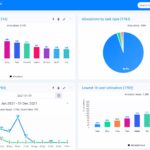In today’s business environment, the focus is increasingly on efficiency, profitability, and risk mitigation. As competitive pressures mount, it becomes vital to employ advanced methodologies to stay ahead. One such methodology that incorporates elements like Cost-Benefit Analysis (CBA) and Risk Management is Smart Project Controlling. This article delves into how leveraging Smart Project Controlling with Risk Mitigation can play an instrumental role in the successful management of business cases.

What is Smart Project Controlling?
Definition and Importance
Smart Project Controlling is a more advanced form of traditional project controlling, incorporating the latest technologies and methodologies for better oversight. This involves not just monitoring and comparison but also proactive measures like Risk Management in Smart Project Controlling, making it integral for time management, cost estimation, and quality assurance. You may also like this Smart Project Controlling Considering Risk Management
Key Components of Smart Project Controlling
Time Tracking
Effective time management starts with meticulous time tracking, essential for staying within the schedule and meeting deadlines, thereby influencing project success directly.
Budget Control
Controlling the project budget involves rigorous financial planning, regular monitoring, and adjustments based on real-time information.
Quality Assurance
Ensuring quality is not just about meeting minimum standards; it’s about exceeding expectations to establish long-lasting customer relations.
Risk Management Strategies for Smart Project Controlling
Risk management is not merely an add-on but a core component of Smart Project Controlling. Properly identifying, assessing, and controlling risks can make the difference between project success and failure.
Understanding Cost-Benefit Analysis
The Basics of CBA
Cost-benefit analysis (CBA) is a financial tool employed to evaluate the cost-effectiveness of different project options. It is essential to make informed decisions based on quantifiable metrics.
Why CBA is Essential in Smart Project Controlling
In the realm of Smart Project Controlling with Risk Assessment, CBA holds an irreplaceable position. It offers a snapshot of the financial implications of various project aspects, including potential risks, thus enabling managers to make well-informed decisions.

Integration: Combining Cost-Benefit Analysis with Smart Project Controlling
Better Decision Making through CBA
Merging CBA into Smart Project Controlling is like adding a financial lens to the project control process, enabling managers to make data-driven decisions that balance cost, time, quality, and risk.
Enhanced Budgeting and Risk Mitigation
Smart Project Controlling with Risk Mitigation strategies ensures a tighter control over financial resources, enabling better alignment with project goals and a more efficient allocation of the budget.
Real-world Case Studies of Smart Project Controlling with CBA and Risk Management
Manufacturing Industry
In a recent case, a manufacturing company utilized Smart Project Management with Risk Control to overhaul its supply chain logistics. The Cost-Benefit Analysis revealed significant long-term savings, which were then monitored and controlled effectively.
IT Sector
A software company employed Smart Project Controlling with Risk Mitigation to guide a complex project from inception through completion. With constant CBA updates and risk assessments, the project was delivered on time and under budget.
Challenges and Limitations of Smart Project Controlling
Complexity
While Smart Project Controlling offers a range of benefits, it also demands a certain level of expertise. The integration of various components like CBA and Risk Management Strategies can make the process complicated.
Data Accuracy for Effective Control
For Smart Project Controlling to be effective, the quality and accuracy of data used in processes like CBA and Risk Management are crucial. Poor or inaccurate data can compromise the reliability of the entire project.
Conclusion
Smart Project Controlling, when fortified with Cost-Benefit Analysis and comprehensive risk management strategies, provides a holistic framework for guiding business cases toward efficiency and profitability. While the challenges are real—ranging from the complexity of integrating various methods to the need for accurate data—the potential benefits make Smart Project control indispensable in today’s competitive business environment.


